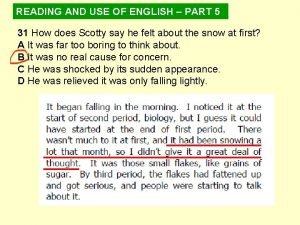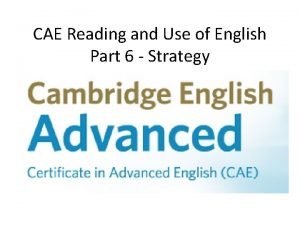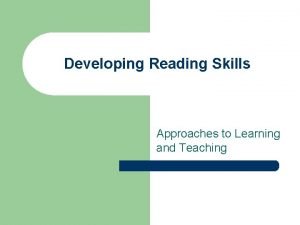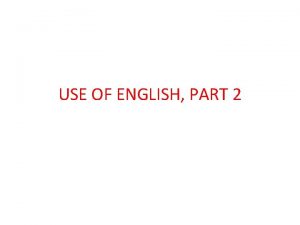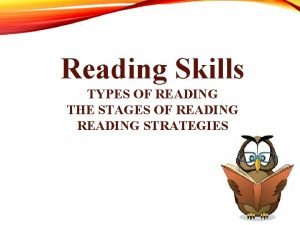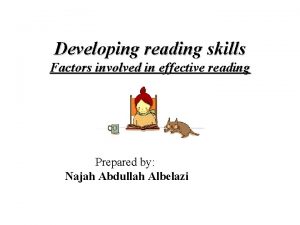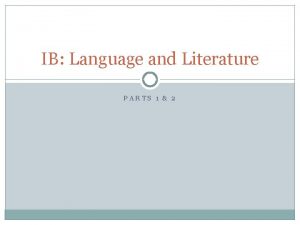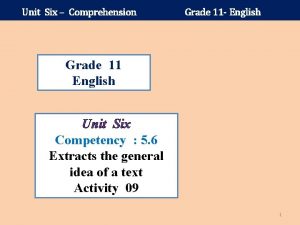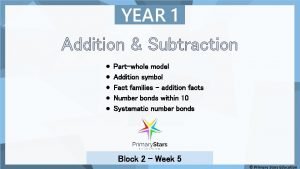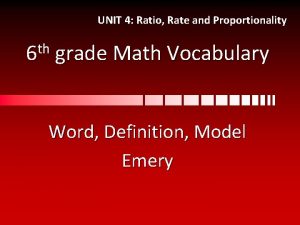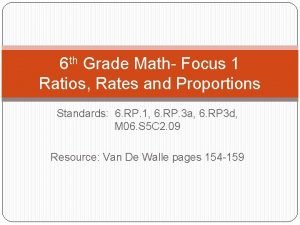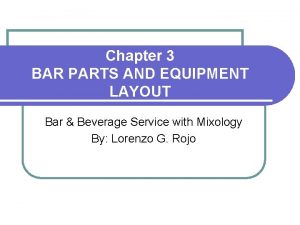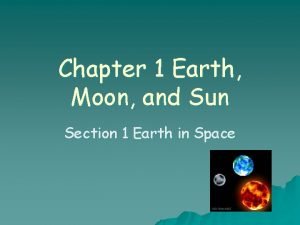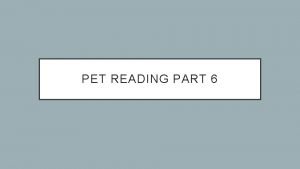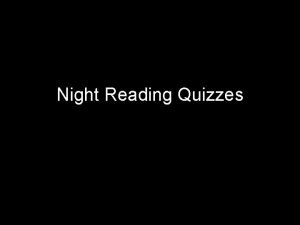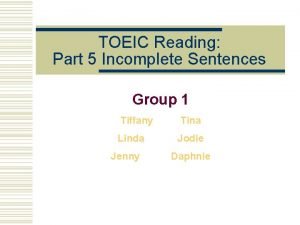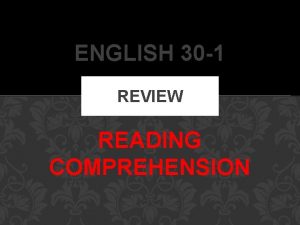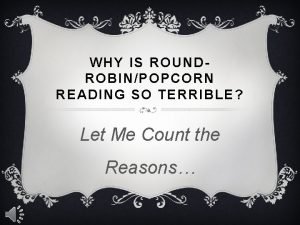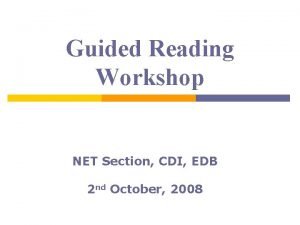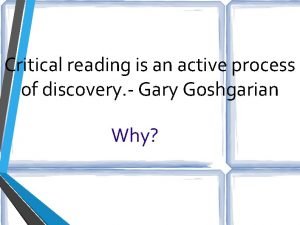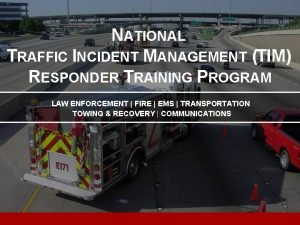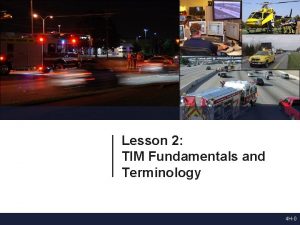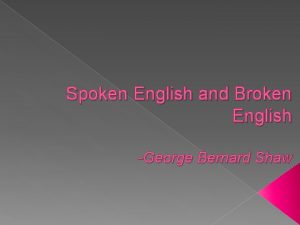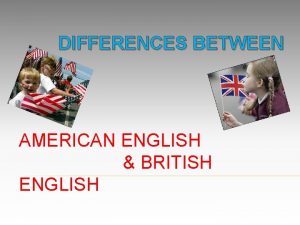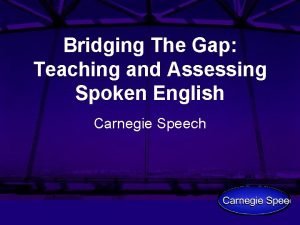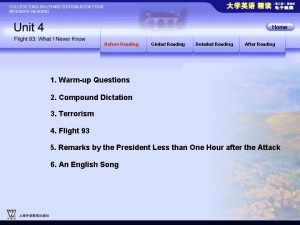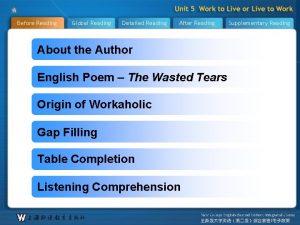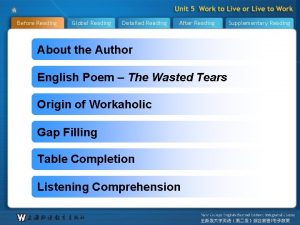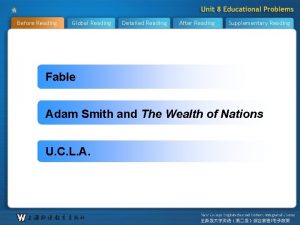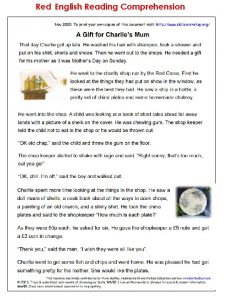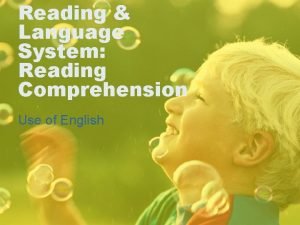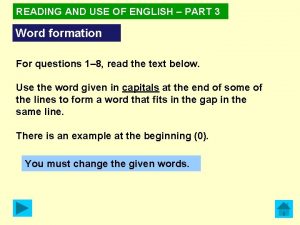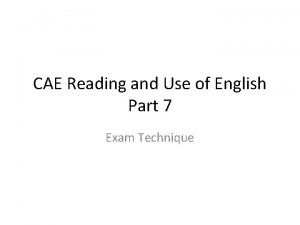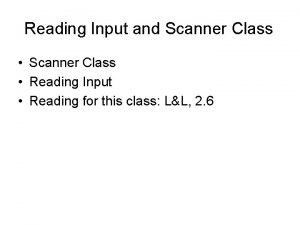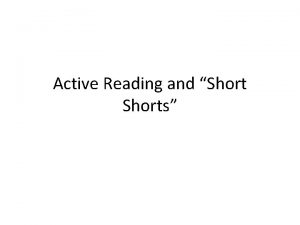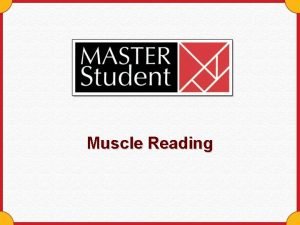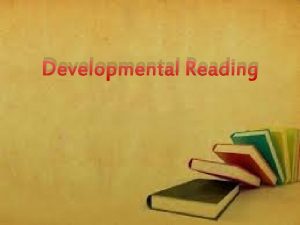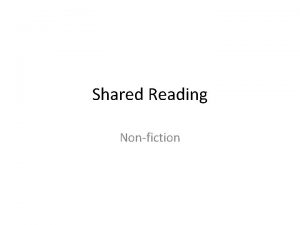Reading and Use of English Part 4 In
































- Slides: 32

Reading and Use of English Part 4

• In this part you will be given a complete sentence followed by a second, incomplete sentence. • You must complete the second sentence so that it has the same meaning as the first using a word given that must not be changed. There are 6 sentences in total. In the exam you transfer your answer to a special answer sheet. • Part 4 tests your knowledge of grammar and vocabulary. It is impossible to predict areas that you could be tested on here. However, the categories listed below appear quite often.

. 1. Comparative & superlative forms; so / such; too / enough We use so/such, too/ enough etc: 1. To say that something has the same of a quality as another, more of a quality than another, or the most of a quality: It is more interesting to visit a place than simply to read about it. 2. To express the idea that (B) < (A) instead of (A) > (B), you can do a) with the construction 'not so/ as … as': • Mars is not so/ as distant as Pluto. b) with an adjective of opposite meaning: • Mars is nearer than Pluto. c) with the construction 'less … than': • Neptune is less distant than Pluto. Only use this construction when you want to say that both objects have the same of a quality, but one has less than the other

3. To say how something is increasing (more and more) or decreasing (less and less): The weather is getting colder and colder. He became more and more/ less and less interested. 4. To say how one thing increases or decreases in relation to another: The older I get, the happier I am. The more I learn, the less I know. 5. In a relative clause, especially with a perfect tense: This is the best beer (that) I have ever drunk. (=I have never drunk better beer. )


2. The passive : revision Passive voice is used when the focus is on the action. It is not important or not known, however, who or what is performing the action. Example: Someone stole my bike(active) My bike was stolen. (passive) When rewriting active sentences in passive voice, note the following: 1. the object of the active sentence becomes the subject of the passive sentence 2. the finite form of the verb is changed (to be + past participle) 3. the subject of the active sentence becomes the object of the passive sentence (or is dropped

Tense • present simple • present cont. • past simple • past continuous • present perfect • pres. perf. Cont. • past perfect • future simple me). • future perf. Active I make a cake. I am making a cake. I made a cake. I was making a cake. I have made a cake. I have been making a cake. I had made a cake. I will make a cake. I will have made a cake. Passive A cake is made (by me). A cake is being made (by me). A cake was being made (by me). A cake has been being made A cake had been made (by me). A cake will be made (by A cake will have been made

• 1) The Government is planning a new road near my house. • 2) My grandfather built this house in 1943. • 3) Picasso was painting Guernica at that time. • 4) The cleaner has cleaned the office. • 5) He had written three books before 1867. • 6) John will tell you later. • 7) By this time tomorrow we will have signed the deal. • 8) Somebody should do the work. • 9) The traffic might have delayed Jimmy.

1. The examiner tells candidates the regulations at the beginning of the exam. TOLD At the beginning of the exam candidates. . . . . the regulations. 2. Did we send that letter to Mr Thomas? WAS Do you know if. . . . . to Mr Thomas? 3. We haven't arranged a date for the wedding yet. BEEN A date for the wedding. . . yet. 4. They will have given him the news by now. TOLD He. . . the news by now. 5. Experts estimate that most people now have access to the Internet. IS. . . most people now have access to the Internet. 6. The garage on the corner usually repairs my car. HAVE I. . . . by the garage on the corner.

3. Direct and indirect (reported) speech • When do we use reported speech? Sometimes someone says a sentence, for example "I'm going to the cinema tonight". Later, maybe we want to tell someone else what the first person said. • We use a 'reporting verb' like 'say' or 'tell'. If this verb is in the present tense, it's easy. We just put 'she says' and then the sentence: Direct speech: I like ice cream. Reported speech: She says (that) she likes ice cream. • We don't need to change the tense, though probably we do need to change the 'person' from 'I' to 'she', for example. We also may need to change words like 'my' and 'your'.



1. 'What do you think of the college? ' ASKED She. . . . . of the college. 2. 'I'll call you later tonight, ' Keith promised. WOULD Keith promised that. . . night. 3. 'I didn't break the window, ' said the boy. DENIED The boy. . . . the window 4. 'Why don't you come this evening? ' SUGGESTED She. . . . that evening. 5. 'You look really tired, ' he told her. SAID He. . . . really tired. 6. 'You must do your homework tonight. ' the teacher said. TOLD The teacher. . . . my homework.

4. Auxiliary/Modal verbs • Auxiliary Verbs are the verbs be, do, have, will when they are followed by another verb (the full verb) in order to form a question, a negative sentence, a compound tense or the passive. • The modal verbs in are English: can, could, may, might, will/would, must, shall/should/ought to. • Modals are different from normal verbs: 1: They don't use an 's' for the third person singular. 2: They make questions by inversion ('she can go' becomes 'can she go? '). 3: They are followed directly by the infinitive of another verb (without 'to').


Past modals • These past modal verbs are all used hypothetically, to talk about things that didn't really happen in the past. • The structure is: Modal verb+ have+ past participle • Examples: I could have stayed up late, but I decided to go to bed early. I shouldn't have eaten so much cake! (= I did eat a lot of cake and now I don't feel good. ) If I had enough money, I would have bought a car (but I didn't have enough money, so I didn't buy a car).

1. I went to the office then remembered it was my day off. 4. They will expect you to wear a suit for the interview. HAVE I. . . to the office as it was my You. . . a suit for the interview. day off. 5. I'd see a doctor if I were you. 2. Perhaps we missed the correct turning. OUGHT MIGHT You. . . a doctor. We. . . the correct turning. 6. He couldn't swim until he was in his twenties. 3. I'm afraid you can't smoke in here. ABLE ALLOWED He. . . until he was in his You. . . in here. twenties.

5. Conditionals • Zero conditional: general truth If + present simple, . . . present simple If you heat water to 100 degrees, it boils • First conditional: things that might happen If + present simple, . . . will + infinitive If it rains tomorrow, we will go to the cinema. • Seconditional: dream/ imaginary situation If + past simple, . . . would + infinitive If I had a lot of money, I would travel around the world. • Third conditional: thing that didn’t happen and have an imaginary result If + past perfect, . . . would + have + past participle (past perfect= had+ past participle) If I had gone to bed early, I would have caught the train.

1. I only told you because I thought you would be interested. TOLD I. . . you if I thought you weren't interested. 4. If you do the washing up I'll make the coffee. PROVIDED I'll make the coffee. . . . the washing up. 2. I won't organise the party unless you arrange the food. LONG I'll organise the party. . . . arrange the food. 5. Your tired because you keep staying up late. WERE If. . . . to bed earlier, you wouldn't be so tired. 3. I think it would be a good idea to speak to the manager first. WERE If. . . . speak to the manager first. 6. You never enter competitions so you'll never win anything. MIGHT If you entered competions. . . . something.

6. Unreal past tenses • he past tense is sometimes used in English to refer to an unreal situation. So, although the verb tense is in the past, we are actually talking about something that didn't happen. This is often the case in conditional sentences when we are talking about a hypothetical situation that might exist now or at any time. We call this use of the past tense "the unreal past". • The unreal past is used after conditional words and expressions like if, supposing, if only, what if; after the verb to wish; and after the expression I'd rather.

CONDITIONAL WORDS AND EXPRESSIONS The expressions if, supposing, if only, what if can be used to introduce hypothetical situations and followed by the simple past tense to indicate that the condition they introduce is imaginary. EXAMPLES • Supposing an elephant and a mouse fell in love. • What if we painted the room yellow? • If you went to the movies, I would babysit. These expressions can also introduce hypothetical situations in the past and then they are followed by the past perfect. EXAMPLES • If only I hadn't kissed the frog. • What if the elephant had stepped on my phone? • Supposing I had given that man my money.

WISHES The verb to wish is used with the unreal past when we want to talk about situations in the present that we are not happy about but cannot change. EXAMPLES • I wish I had more money. • She wishes she was beautiful. • We wish we could come to your party. When we want to talk about situations in the past that we are not happy about or actions that we regret, we use the verb to wish followed by the past perfect. EXAMPLES • I wish I hadn't said that. • He wishes he hadn't bought the car. • I wish I had taken that job in New York. When we want to talk about situations we are not happy about and where we want someone else to change them, we use to wish followed by would + infinitive. EXAMPLES • I wish he would stop smoking. • I wish you would go away. • I wish you wouldn't squeeze the toothpaste from the middle!

PREFERENCES USING "I'D RATHER" AND "IT'S TIME" I'd rather and it's time are also followed by the unreal past. The verb is in the past tense, but the situation is in the present. When we want to talk about a course of action we would prefer someone else to take, we use I'd rather + past tense. EXAMPLES • I'd rather you went. • He'd rather you called the police. • I'd rather you didn't hunt elephants. The stress can be important in these sentences, to show what our preference is. EXAMPLES • I'd rather you went. (instead of me) • I'd rather you went. (instead of staying) • He'd rather you called the police. (instead of me) • He'd rather you called the police. (instead of the firemen)

1. I'd love to know how John is getting on. 4. He behaves like the President of the company. KNEW THOUGH I. . . how John was getting on. He acts. . . . the President of the company. 2. You should take an umbrella with you. BETTER 5. I regret not inviting Cathy to the party. You. . . an umbrella with you. ONLY If. . . . Cathy 3. I think taxes should be increased. TIME 6. I'd prefer you to get home early tonight. It. . . increased RATHER I. . . . home early tonight.

7. Phrasal verbs • A phrasal verb is a verb like pick up, turn on or get on with. These verbs consists of a basic verb + another word or words. The two or three words that make up a phrasal verb form a short "phrase" which is why we call them "phrasal verbs". But a phrasal verb is still a verb. Look is a verb. Look up is also a verb - a different verb. They do not have the same meaning, and they behave differently grammatically. You should treat each phrasal verb as a separate verb, and learn it like any other verb.

10 most common phrasal verbs. 1. Go on – to happen or occur There is a debate going on right now between the two parties. 2. Pick up – to get or take somebody or something from a place Can you pick up some food on the way home from work please? 3. Come back – to return to a place or a conversation topic She came back to the kitchen with a bottle of wine. 4. Come up (with) – to think of or produce something – to return to a place or a conversation topic She instantly came up with a solution to the problem. 5. Go back – to return to a place, time, situation, activity or conversation topic. He washed the dishes and went back to his room. 5. Go back – to return to a place, time, situation, activity or conversation topic He washed the dishes and went back to his room. 6. Find out – to discover something We need to find out who ate the cheese. 7. Come out – to leave a place (room, building, container) or appear from it She went into the bank and came out with some money 8. Go out – to leave a room, building, car, or one’s home to go to a social event We should go out for dinner sometime 9. Point out – to direct attention toward something (fact, idea, information) Experts have pointed out that eating too much sugar is extremely unhealthy. 10. Grow up – to gradually advance in age and maturity Seeing my kids growing up is such a lovely thing.


8. Verb patterns: gerund and infinitive We use gerunds (verb + ing): • After certain verbs - I enjoy singing • After prepositions - I drank a cup of coffee before leaving • As the subject or object of a sentence - Swimming is good exercise We use 'to' + infinitive: • After certain verbs - We decided to leave • After many adjectives - It's difficult to get up early We use the bare infinitive (the infinitive without 'to'): • After modal verbs - I can meet you at six o'clock • After 'let', 'make' and (sometimes) 'help' - The teacher lets us leave early. • After some verbs of perception (see, watch, hear, notice, feel, sense) - I watched her walk away • After expressions with 'why' - why go out the night before an exam?



• Exeptions: remember, forget, try, stop, regret. These verbs can be followed by either the gerund or the infinitive with a change in meaning.

1. It's really important that you pay the bill today. REMEMBER You must. . . the bill today. 2. I think it would be a good idea if you joined the beginner's class. SUGGEST I. . . . the beginners class. 3. Meeting John in town was really surprising. EXPECT I. . . . John in town. 4. In the future she became a successful business woman. WENT She. . . . a successful business woman. 5. I'll help you with your homework. MIND I. . . . you with your homework. 6. I hated driving on the left at first but now it's OK. USED I. . . . on the left now.
 Scotty weems answers
Scotty weems answers Cae reading tips
Cae reading tips Pre reading while reading and post reading activities
Pre reading while reading and post reading activities Part 2 use of english
Part 2 use of english Aims and objectives of teaching
Aims and objectives of teaching Types of reading
Types of reading Real definition of extensive reading
Real definition of extensive reading Intensive and extensive reading
Intensive and extensive reading What is intensive reading
What is intensive reading Ib english language and literature part 3
Ib english language and literature part 3 How to answer comprehension questions grade 11
How to answer comprehension questions grade 11 Academic english reading and writing across the disciplines
Academic english reading and writing across the disciplines Part whole model subtraction
Part whole model subtraction Unit ratio definition
Unit ratio definition Part part whole
Part part whole What is a technical description?
What is a technical description? Parts of a bar graph
Parts of a bar graph The part of a shadow surrounding the darkest part
The part of a shadow surrounding the darkest part 미니탭 gage r&r 해석
미니탭 gage r&r 해석 Reading part 6 pet 2020 pdf
Reading part 6 pet 2020 pdf Night chapter 1 quiz
Night chapter 1 quiz Toeic part 5
Toeic part 5 Modern drama reading comprehension test
Modern drama reading comprehension test St. louis
St. louis What is shared reading
What is shared reading Prerequisite of discovery in critical reading
Prerequisite of discovery in critical reading How you use ict today and how you will use it tomorrow
How you use ict today and how you will use it tomorrow Road terminology
Road terminology The use of uniform terminology and plain english
The use of uniform terminology and plain english Spoken english and broken english g.b. shaw summary
Spoken english and broken english g.b. shaw summary Difference between british and american english
Difference between british and american english American and british english
American and british english Spoken english and broken english summary
Spoken english and broken english summary
